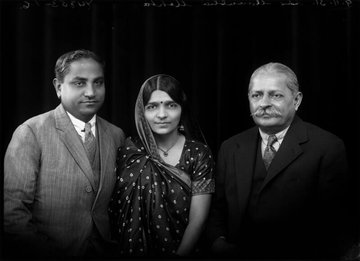
Hansa Mehta
‐
Human rights activist
Place of birth
Date of arrival to Britain
Place of death
India
About
Hansa Mehta was born in Surat in Gujarat in 1897. She was the daughter of Sir Manubhai Nandshanker Mehta, who was Professor of Logic and Philosophy and Lecturer in Law at Baroda College at the time of her birth. In September 1919, at the age of 22, she sailed to Britain to study at the London School of Economics. In June 1920 she joined Herabai Tata, Mithan Tata, Sarojini Naidu, Lolita Roy and Mrinalini Sen, alongside four other Indian women, as delegates at the International Women’s Suffrage Alliance Congress in Geneva. Upon her return to India, Mehta remained heavily engaged in suffrage and women’s politics.
In 1945–6 Mehta was President of the All India Women’s Conference. She was one of the members of the Constituent Assembly of India and involved in the framing of the new constitution. In 1947 Hansa Mehta was sent as India’s delegate to the United Nations Commission on Human Rights, which met at Lake Success in New York. Mehta proposed Eleanor Roosevelt as Chair and Mehta was instrumental in rewriting the Universal Declaration of Human Rights from ‘all men are created equal’ to ‘all human beings’.
Hansa was married to Dr Jivraj Narayan Mehta (1887–1987), who had studied medicine in London between 1909 and 1915 and had been President of the Indian Students' Union. Their marriage led to Hansa’s ex-communication from her Brahmin community as her husband belonged to the lower Vaishya caste. In 1931 the couple were in London and had a photo portrait taken with Hansa Mehta’s father, who was by then Prime Minister of Bikaner State. Dr Mehta was briefly Mohandas K. Gandhi’s private doctor. In 1963 Dr Mehta was appointed Indian High Commissioner to the United Kingdom and Hansa Mehta accompanied him to London. They lived in London together between 1963 and 1966. During this time, Hansa Mehta attended a BBC conference held on 6 July 1965 with other representatives from Indian, Pakistani and Caribbean communities, including Dhani Prem, to discuss immigration issues and the possibility of producing bespoke radio and television programmes.
Indian Woman (Delhi: Butala & Company, 1981)
Adami, Rebecca, Women and the Universal Declaration of Human Rights (Abingdon: Routledge, 2019)
Chetan, Achyut, Founding Mothers of the Indian Republic: Gender Politics of the Framing of the Constitution (Cambridge: Cambridge University Press, 2023)
Giese, J., Bisht, D. and Punathambekar, A. ‘Public Service Media and Race Relations in Postcolonial Britain: BBC and Immigrant Programming, 1965–1988,’ Media, Culture & Society 45.6 (2023), pp. 1210–24
Jayal, Niraja Gopal, ‘Hansa Mehta: An Early Indian Feminist’, South Asia @ LSE (12 September 2022), https://blogs.lse.ac.uk/lsehistory/2024/03/06/hansa-mehta-an-early-indian-feminist/
Mukherjee, Sumita, Indian Suffragettes: Female Identities and Transnational Networks (New Delhi: Oxford University Press, 2018)
Sandell, Marie, ‘Learning in and from the West: International Students and International Women’s Organisations in the Interwar Period’, History of Education 44.1 (2014), pp. 5–24
BBC (1965b) First conference on immigrants. Future of broadcasting: Immigrants conference-R31_105_02. 06.07.65, BBC Written Archives, Caversham, Reading
Hansa Mehta Papers, Nehru Memorial Library and Museum, New Delhi
United Nations Archives
Image credit
Jivraj Narayan Mehta; Mrs Hansa Mehta; Sir Manubhai Nandshankar Mehta, by Bassano Ltd, half-plate glass negative, 9 November 1931, NPG x150708
© National Portrait Gallery, London, Creative Commons, http://creativecommons.org/licenses/by-nc-nd/3.0/
